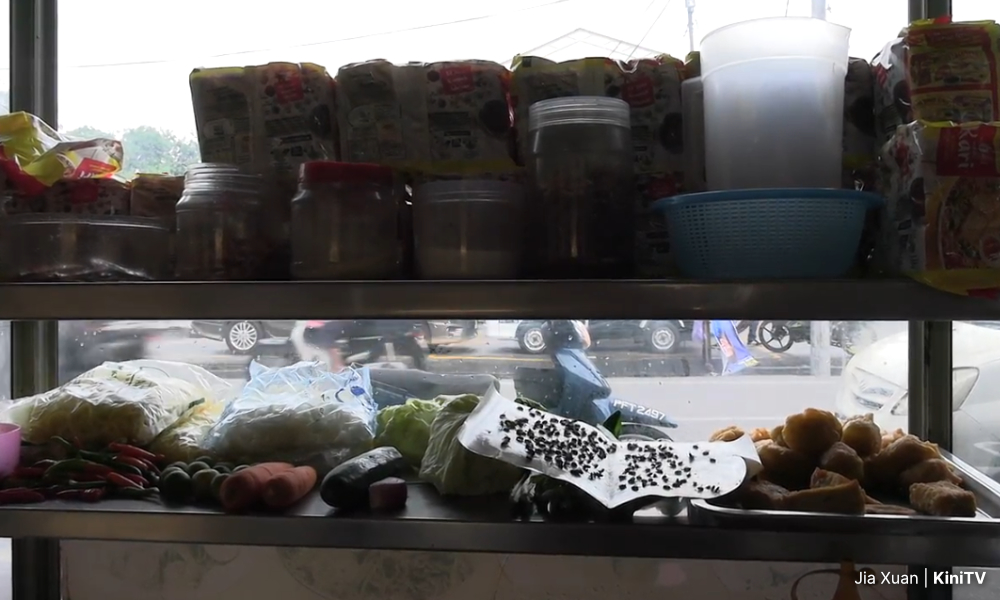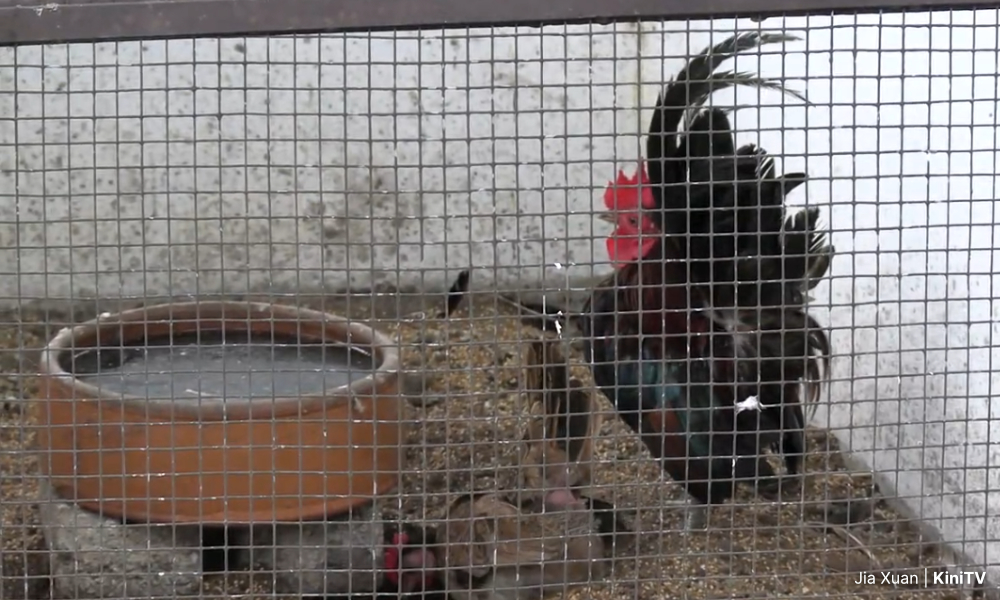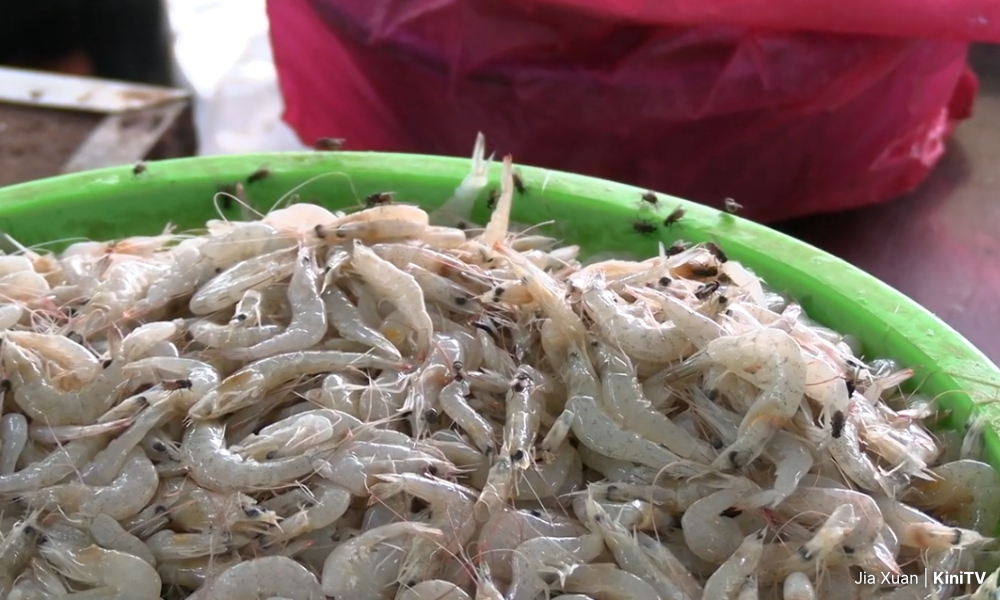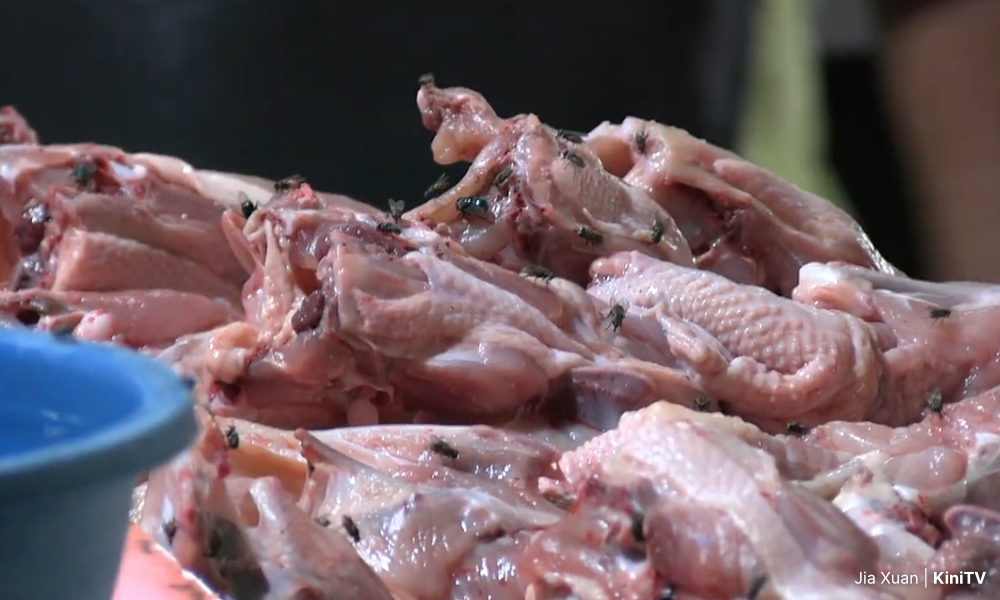SUNGAI BAKAP BY-ELECTION | A persistent fly infestation has local traders and customers in Sungai Bakap up in arms, as the pesky insects continue to swarm the local markets and food vendors.
The infestation, according to local traders, follows a seasonal pattern closely tied to weather conditions and harvesting cycles, particularly those of chicken and pig farms in the vicinity.
Forty-four-year-old seafood trader, Mohd Zaini Mohd Ibrahim told Malaysiakini that a lot of his customers have complained about the problem that has been affecting both traders and shoppers in Sungai Bakap morning market.
"I only sell fish, so I can chase them away but it's a bit hard for the ready-made food traders," he said.
Right outside the morning market, a veteran restaurateur Mohd Yusuf Mohd Kassim said that he pointed his finger towards chicken and pig farms in Sungai Bakap.

According to Yusuf, he knows that there were a few farms about a few kilometres away from the small town of Sungai Bakap, adding the fly infestation gets worse when it is harvesting season.
"When the (harvesting) season comes, and the chickens are out, they (flies) will come here.
"When the chicken manure is there, they will stay there. When the farmers catch all the chicken, the flies will be out as well," he said.
According to the Penang State Veterinary Services Department (JPVPP), Sungai Bakap - which falls under Seberang Perai Selatan - has the highest population of farmers in the state.
At least 115 farms are registered under the state government agency which consists of a variety of chicken and duck farms.

To be qualified for a licence under the JPVPP, farmers must have at least 10,000 livestock in their production facilities, of which quite a number of those communities in Sungai Bakap are still left unidentified.
Responding to this, JPVPP director Dr Saira Banu Mohamed Rejab said that the state government has strict guidelines on how to operate a farm, which is stipulated under the Penang Poultry Farming Enactment 2020 and Poultry Farming Regulations 2022 were enforced on January 1, 2024.
"Prior to the enforcement of this enactment, this legislation was fully under the jurisdiction of the local authorities, namely Seberang Perai City Council and Penang Island City Council," she told Malaysiakini.
"We've given licensed poultry farmers until April 30 to comply with strict licensing conditions, especially regarding proper waste management," she stated.
Saira added that her department has already begun cracking the whip, issuing six compounds to farms where fly populations have spiralled out of control.
"When we're seeing more than 15 flies in a 10-second count, or finding maggots in the droppings, that's when we step in.
"But we're also working with farmers, advising on better spraying schedules," she said.
Health concerns
However, for the people living around the area, the infestation is more than just an annoyance - it's a health concern.
Although there were no cases of food poisoning among her family members, a mother of two, who only wanted to be known as Mena, said that she was worried about the quality of food served to her children.
"I worry about (potential) food poisoning, I have kids at home, of course, so I have to be cautious" Mena said.

Echoing Mena’s concerns, 44-year-old Mohd Nazir Hashim expressed the same sentiment, saying that even though none of his relatives suffered food poisoning, he stressed that it could not be the same case with everyone else.
Giving his perspective on what the state government has currently implemented, Penang state executive councillor for Agriculture, Fahmi Zainol, outlined the government's longer-term strategy to address the root cause.
He said that with all the aforementioned laws being implemented across the state, Penang is the first to mandate an enclosed farming system, that will not just be remedial measures to contain fly issues but rather the industry's ecosystem as a whole.
“We estimate that for another five pig farms across Penang, it might take a month or two more to fulfil 100 percent of Penang's food needs.
“For certain involving poultry farms, we estimate it'll take about two years. Right now, we're in the implementation phase. I estimate by 2026, we should close everything up,” he told Malaysiakini.
Poultry farmers taking action
Feeling the heat over the spiralling accusations, local poultry farmers are stepping up their efforts to address the fly infestation issue plaguing Sungai Bakap.
One of the Sungai Bakap industry representatives, only known as Tan, has outlined a multi-pronged approach to tackle the problem at its source.
"Firstly, we need to take care of the biosecurity of the farm strictly.
"This means implementing rigorous cleanliness protocols across all our operations."
He said that maintaining a clean and dry environment, particularly when it comes to managing chicken manure, is crucial for fly control.

The farmers are also exploring technological solutions as he said that the farmers are looking into using enzymatic feed additives that can reduce the odour of manure, which in turn, makes it less attractive to flies.
Additionally, the use of approved insect control medications for targeted spraying is also being considered as part of an integrated pest management strategy.
However, Tan stressed that these measures are just part of a larger commitment.
"Ultimately, it's about each farmer taking their role and responsibilities seriously.
"We must ensure our farms are always in compliance with the JPVPP rules and regulations. It's not just about avoiding fines; it's about being good neighbours and responsible members of the community," he said.
As Sungai Bakap's poultry farmers work to implement these measures, residents remain cautiously optimistic.
The effectiveness of these steps, coupled with the government's push for enclosed farming systems, may finally provide some relief from the persistent buzz that has long been the town's unwelcome “soundtrack”. - Mkini




No comments:
Post a Comment
Note: Only a member of this blog may post a comment.